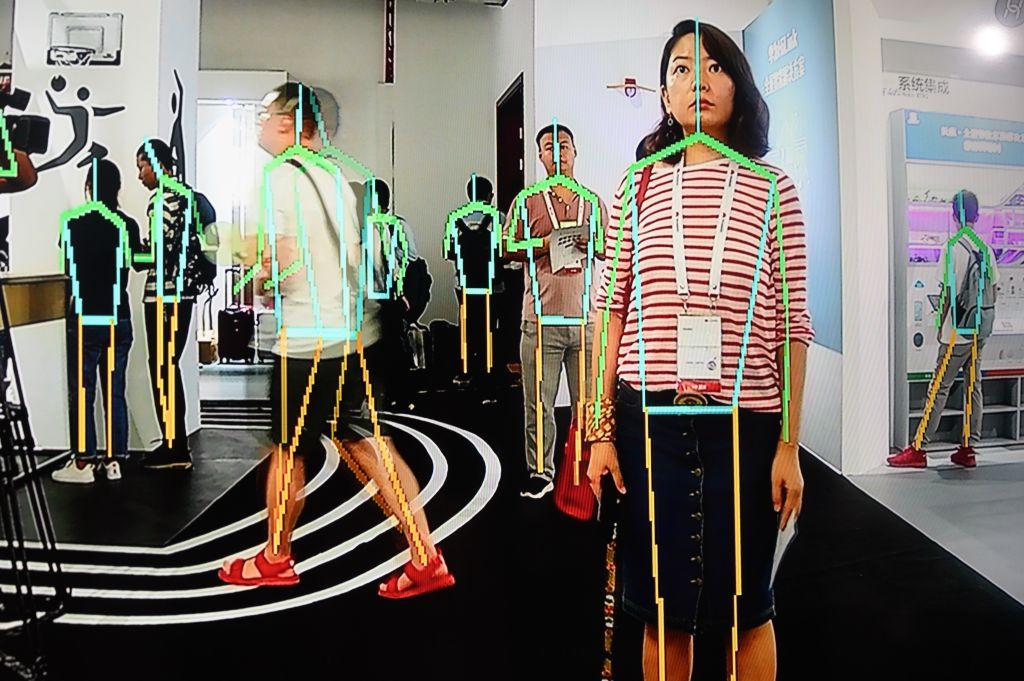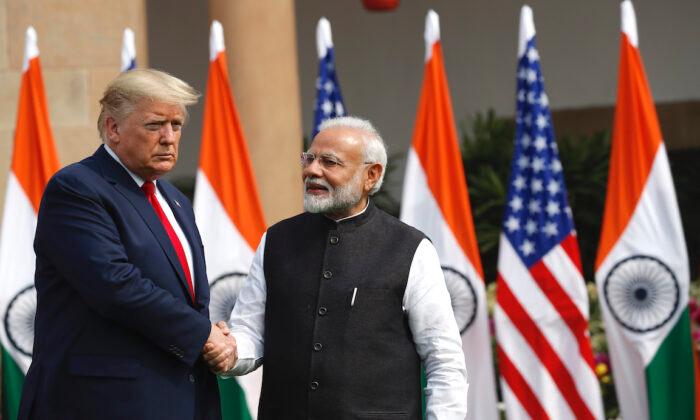The Chinese regime is using its 5G telecommunication company, Huawei, to make geopolitical gains in the Middle East over the United States, according to experts who call Huawei a part of communist China’s gameplan to build its “digital silk route.”
“Huawei, as a leading Chinese technology company, is naturally important for the Chinese government’s strategy. Then again, many Chinese technology companies are trying to be part of this digital Silk Road,” Yau Tsz Yan, a researcher at OSCE Academy in Bishkek, Kyrgyz Republic, told The Epoch Times via email.
“The government is willing to spend, and lots of other tech companies also want to have a part of the pie. It’s not just about money, being a company that is useful for government strategies is very important, because having communist party support is useful for any business in China,” said Yau, who specializes in Central Asian affairs and is a graduate from the University of Hong Kong.
“As part of the ‘digital Silk Road,’ satellites are another priority for China in the Middle East. China’s BeiDou satellite navigation system has been used across the Middle East, as it has applications in telecommunications, maritime security, and precision agriculture. Telecommunication companies in Bahrain, Egypt, Kuwait, Saudi Arabia, and the UAE have all partnered with Huawei to build 5G networks,” according to the ECFR.
The ECFR said the U.S. administration strongly opposes Huawei in the Middle East because it fears “potential security risks that could come with the company’s access to their networks such as invasive surveillance technology.”
Kashish Parpiani, Research Fellow at the Observer Research Foundation, describes Huawei’s growing market in the democracy-starving Middle East as a “supplementary” reason behind the United States opposition to Huawei’s global expansion as a 5G provider.

“The same is reflected in the fact that, increasingly, high-level Trump administration officials like Vice President Mike Pence and Secretary of State Mike Pompeo have called out China for ‘exporting’ their model of the authoritarian, state-controlled market, Orwellian surveillance state,” Parpiani told The Epoch Times.
Digital geopolitics is not a new domain and according to Parpiani, the United States still dominates the cyber world because the internet and GPS were primarily Pentagon projects. The United States has positioned 24 satellites that orbit the earth to provide navigation services to the world.
However, experts and reports say China’s digital silk route is all about the CCP’s aspiration to become a “cyber superpower” and this is a direct challenge to the United States all around the world, including the Middle East.
Threat Perception About Huawei
The U.S. Commerce Department banned national companies from selling any products to Huawei in May this year. Experts say the U.S. threat perception of the Chinese telecommunication giant is because of the CCP’s aspirations to become a cyber superpower and Chinese laws that make it mandatory for Chinese companies to open their information systems to state intelligence agencies.Cook talked about countering China and helping the United States to remain the world leader in advanced technologies and innovation, and said Chinese leader Xi Jinping specified the importance of innovation in making China a global superpower during his October 2017 speech at the 19th Party Congress.
Xi’s speech followed an article in the Party journal Qiushi that outlined Xi’s and the CCP’s vision of making China a cyber superpower.
The article was written by Cyberadministration of China, the country’s top internet regulator, and talked about “expanding information controls beyond China’s borders.”
“The article’s authors note that online propaganda should also target international audiences with the goal of ‘expanding online international communication to 200 countries … and more than 1 billion overseas users.’”
“They also state that the purpose of strengthening international exchanges and cooperation in the field of information technology and cybersecurity—including with the United States—is ’to push China’s proposition of Internet governance toward becoming an international consensus,'” Cook told the House Committee.

More importantly, the report indicates that Huawei is an easy tool in the hands of the Chinese regime to be used against the United States because of Beijing’s Counter-Espionage Law and a National Intelligence Law that “allows the Communist Party to compel Chinese companies to turn over information and open their systems to the country’s intelligence and security apparatus.”
The Atlantic Council report also said that Huawei is an “effectively state-owned” company contrary to its claims of being an employee-owned company.
“Many national security experts are worried that Huawei would be unable to resist a request from the Chinese Communist Party to provide sensitive data collected from its networking systems. Put together, this means that many Americans have concerns about not only Huawei’s 5G technology but also its general presence in the U.S. market,” Zack Cooper, Research Fellow at the American Enterprise Institute in Washington, told The Epoch Times.
It is for these reasons the Trump administration has not allowed Huawei to enter the U.S. market. It has also tried dissuading its international allies and partners from using Huawei 5G equipment due to security concerns.

The overall scenario gets more complicated as Huawei has also been accused of intellectual property threats.
Huawei “has a documented history of attempting to exploit foreign innovation to its own benefit, with several cases now in the courts. Huawei is a concern not only because it has tried to acquire foreign technology through illicit means, but also because it has broken U.S. sanctions laws,” said Cooper.
Huawei Smart Cities in the Middle East
Many countries in the Middle East have either deployed Huawei’s 5G networks or are in the process of deploying them. For the nations in the Middle East, this is an opportunity to propel “economic diversification, deliver public services more effectively and efficiently, and promote sustainable growth” but for the United States, it’s a geopolitical challenge, Calabrese wrote.5G networks were recently launched in Qatar, Saudi Arabia, and the United Arab Emirates (UAE) and will soon be launched in Bahrain, Kuwait, and Oman, according to the MEI.
These 5G networks are the backbone of multiple Huawei smart city projects in the region. Calabrese wrote that in the Gulf markets, “governments, as part of their attempt to move away from oil-based economies, are investing heavily in upgrading network infrastructure and undertaking smart city projects and digital initiatives.
“GCC leaders clearly recognize that innovative technologies such as 5G have the potential to catalyze a ‘digital transformation’ that can support their respective national development visions/agendas and significantly boost GDP.”

Yau said the Chinese first called its smart cities “safe cities,” and it all started as a traffic monitoring system and soon evolved into a facial recognition technology constantly surveilling people around China.
Huawei is also helping the Uzbek government to develop 883 cameras in the Uzbek capital to “digitally manage political affairs.” In Kazakhstan, the company is working along with the local telecommunication companies on over 2,000 cameras.
Yau mentioned in The Diplomat that the Chinese government has urged its partner countries in the Belt and Road Initiative to extend information and make the Digital Silk road possible.
In her interview with The Epoch Times, Yau explained why these things have serious geopolitical implications for the United States.
Checking Huawei’s Expansion in the Middle East
The Middle East Institute says that U.S. concerns about Huawei also arise from the methods the Chinese telecommunication company has employed to control the market and the overall digital geopolitical scenario has forced the United States to face the issue head-on.Calabrese quoted a memo by a senior U.S. National Security Council official that was leaked by Axios in January 2018.
“Huawei has used market-distorting pricing and preferential pricing to dominate the global market for telecommunications infrastructure,” said the memo.
“The leader of 5G stands to gain hundreds of billions of dollars in revenue over the next decade, with widespread job creation across the wireless technology sector,” Calabrese further added.
The MEI expert said President Donald Trump believes that national security is linked to economic security and this has driven his “America First” agenda.

“Over the past year, the Trump administration, invoking national security, has mounted an all-out offensive against Huawei. U.S. officials have lobbied allies to reject Huawei’s 5G technology and to help slow its expansion into third markets,” wrote Calabrese.
He, however, mentioned that these efforts haven’t yielded adequate results—European nations are likely not to impose a ban on Huawei and the U.S. efforts haven’t got “much traction” even in the Gulf.
Calabrese wrote that the U.S. 5G wars with Huawei remain “clouded by uncertainty,” however the countries in the Middle East have realized that security risk might arise and they “can be mitigated.”
“It’s difficult to say if China is supporting authoritarian regimes in the ME, but China is certainly not promoting democracy,” Yau told The Epoch Times.





